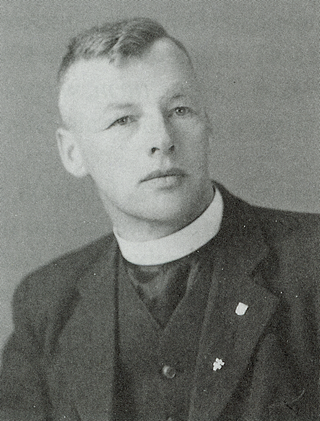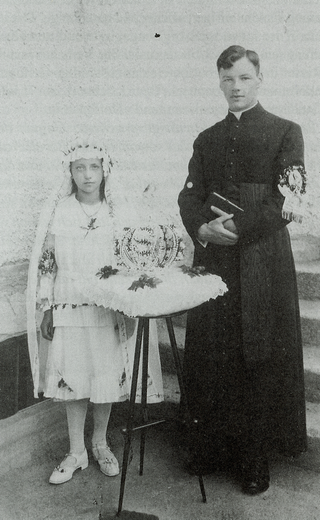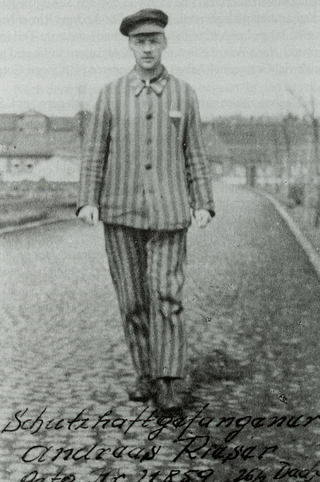Andreas Rieser

Personalia
Born:
Died:
Profession:
Persecution:
Imprisonment 23.06.1938 - 03.08.1938,
Dachau concentration camp 03.08.1938 - 26.09.1939,
Buchenwald concentration camp 26.09.1939 - 06.12.1940,
Dachau concentration camp 06.12.1940 - 01.05.1945
KZ Number:
Curriculum Vitae
The Angel of Dachau
Andreas Rieser was the second of seven children born to the farming family of Josef and Theresia Rieser in Luggau near Dorfgastein. He grew up with his four brothers and two sisters on the Präau-Lehen farm, which is why the family was known as the Präers. He attended elementary school in Dorfgastein and had to witness the sad retreat of the defeated Austro-Hungarian army and the fall of the Dual Monarchy on the nearby Tauern Railway towards the end of the First World War.
In 1919, he transferred to the Borromäum Archbishop's Boys' Seminary in Salzburg, where he graduated in 1928. He then immediately entered the seminary in Salzburg, where he was finally ordained a priest on July 10, 1932. In 1933, Andreas Rieser became a cooperator (chaplain) in Stumm in the Zillertal. He was a staunch opponent of the emerging National Socialism and made no secret of this in his sermons.
Rieser was always an outspoken opponent of National Socialism and expressed this both to the population and in his sermons, often causing offense. Around two years ago, he is said to have made the following statement: '10 communists are better to me than one Nazi'. However, this statement could not be verified for the time being. After the upheaval, he remained completely quiet in the local district, both in his sermons and in his dealings with the population.
After the parish priest of Dorfgastein, Franz Arno Binna, had to fear arrest due to his anti-Nazi journalistic commitment to the Fatherland Front, he fled to Italy. As a result, Andreas Rieser was entrusted with the management of the parish of Dorfgastein on June 1, 1938. Even one of his first sermons, the one on Trinity Sunday, caused displeasure among the National Socialist nomenklatura, especially as it contained "insinuations about the present day", albeit "in a hidden, unprosecutable form".
In his new parish, the tower cross with the sphere underneath (the so-called knob) had to be replaced. On June 18, 1938, the workmen finished and were only waiting for a contemporary document to be deposited in the knob. [Note: It used to be customary to deposit a document of historical value for posterity before soldering the knob]. Since Pastor Franz Arno Binna was no longer available at this time, Andreas Rieser wrote a commemorative document on parchment paper at 11:00 am. In this commemorative document, entitled "In memory of later times", he assesses the current religious, political and economic situation under the new circumstances, focusing in particular on the emergence and spread of National Socialism. At 12:00 noon, he hands the letter over to the craftsmen for soldering. However, they pass it on to the fanatically National Socialist municipal secretary, teacher and secretary of the local NSDAP, Wilhelm Katholnigg, who forwards it to the post commander Emil Hübner, also a convinced National Socialist.

The Hitlers gradually emerged around 1928. The founder was Adolf Hitler, who came from Braunau am Inn. [...] Through ruthlessness and violence [...] he initially succeeded in gaining power in Germany.
[...]
National Socialism, which was striving for a Greater Germany, looked with envy at Austria and wanted to seize it. [...] Now Hitler began to destroy Austria with acts of violence. [...] Dullfuß had to ban the Nazis because they were carrying out bomb attacks on bridges, railroads and industrial plants, on important personalities and the like. Of course, there were many Nazi supporters and traitors in our own country [...] The hatred from outside grew to such an extent that attempts were made to take the small country by force. The Austrian Legion, i.e. defectors to or into the Third Reich, were incited to overthrow the Dollfuß government in conjunction with their own Nazis. [...] Schuschnigg became Federal Chancellor and now the Nazis were unfortunately not dealt with sharply enough. Now they tried to ruin and undermine Austria through the Nazis in their own country. Everything was precisely organized from outside and everything in Austria was undermined and subverted.
[The free referendum by Chancellor Schuschnigg] would have turned out brilliantly for Schuschnigg.
This is how Austria was invaded. And that's called liberation!!! [...] The whole regime of violence can probably not last long. We hope that Austria has not finished its role, otherwise God would not have let us fight for 5 years from 1933 to 1938. Prussia must be crushed and then Austria can rise again, but after what sacrifices?
[...] One reckons with a general terrible world war, compared to which the world war of 1914 - 1918 was only child's play. [
Many important men who worked under Schuschnigg were sent to the notorious concentration camp in Dachau. They were said to have been horribly mistreated there. [...]
Written in Dorfgastein, on the Saturday before Corpus Christi Sunday, June 18, 1938. Andreas Rieser e.h. Koop. in Stumm, currently Provisor in his home parish.
Andreas Rieser is not arrested immediately. However, for fear of reprisals against his family, he decides not to flee. In a depressed mood, he attended the parish service followed by the Corpus Christi procession on June 19, 1938 and informed Auxiliary Bishop Filzer about the situation and his ill-advised actions on June 20, 1938. Although the post commander Emil Hübner told Andreas Rieser that the most he could expect was a harsh reprimand, he had already written to the Gestapo on June 18, 1938, describing Rieser's rash removal from Dorfgastein as necessary, as he had the best field for agitation here in his actual homeland as a result of his anti-state sentiments.
[The Dachau concentration camp was] the mother of concentration camps, a stronghold of pain, a blast furnace of testing and purification, the largest monastery in the world, a school of character and virtue, a place of martyrdom, etc... [... The treatment was] no longer inhuman, nor animalistic, but diabolical.
In Dachau concentration camp, Andreas Rieser was assigned to a punishment company, which meant more work, humiliation, hunger, abuse and torture. When he was sent to Dachau concentration camp, he also received an accompanying letter with his curriculum vitae and the reason for his arrest, so that the guards knew exactly how to treat him. He was mistreated to such an extent that he spent four weeks in the infirmary and barracks. He is then assigned to the roofers, where he also gets to know and appreciate the later Federal Chancellor and Foreign Minister Leopold Figl.
The National Socialists in the concentration camp repeatedly try to dissuade priests from their priestly vocation, often with the help of false promises (release, well-paid position, etc...). Again and again he hears the words: 'Marry, have children, etc.' Once he is the protective custody camp leader himself, who summons him. Referring to a Salzburg priest who had given up his profession, was now married and had a nice job, he urged Andreas Rieser to 'break with this old-fashioned stuff' so that he could be released and 'have hope of a promising future'. Andreas Rieser did not allow himself to be influenced by the National Socialists.
On September 26, 1939, Andreas Rieser was transferred from Dachau to other concentration camps due to the start of the war. Andreas Rieser was sent to Buchenwald concentration camp and was again sent to a punishment company there. Due to the outbreak of dysentery, work was temporarily suspended on All Saints' Day 1939 and in January 1940 he was released from the punishment company to the "normal" concentration camp. On September 17, 1940, the priests were withdrawn from the labor service and isolated. There he also met his confrere Leonhard Steinwender.

On December 6, 1940, Andreas Rieser was taken back to Dachau concentration camp and locked up in a priest's block with many Austrian priests. A little later, they were even allowed to celebrate mass there again. On April 28, 1942, he was appointed to the position of main or general command clerk. In this position, he tried to do a lot of good for his fellow prisoners. This great willingness to help his fellow brothers and fellow prisoners earned him the honorary title Angel of Dachau.
When camp dean Georg Schelling was released from Dachau concentration camp in April 1945, he appointed Andreas Rieser as his successor. On April 26, 1945, Dachau concentration camp was evacuated and a death march to Ötztal began. On May 1, 1945, he was finally liberated in Waakirchen in Bavaria.
On May 30, 1945, Andreas Rieser returned to his home in Dorfgastein. He suffers from the health consequences of his imprisonment for the rest of his life. After his return, he became a cooperator in Reith near Brixlegg and, from August 1, 1948, a priest in Bamberg. He died there of a heart attack at the age of 58.
Places
Persecution:
Place of activity:
Citations
- Mikrut, Jan (2000): Blutzeugen des Glaubens. Martyrologium des 20. Jahrhunderts. Band 3 (Wien), p. 245–265.
